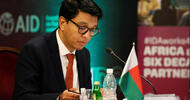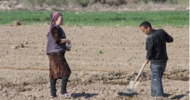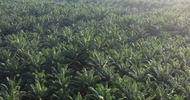The boom in the acquisition of arable land in Africa by foreign companies and governments has stirred an international debate between international institutions such as the United Nations’ Food and Agriculture Organisation (FAO) and non-governmental groups and independent experts.
After years of competing for overseas oil and mines, India and China are silently scouring the world for their next great need: farmland to grow food.
- Hindustan Times
-
04 May 2009
Dependence on oil imports may be influencing the Ethiopian government’s decision to lease farmland to Saudi Arabia
- Farm Radio Weekly
-
22 December 2008
On the eve of an annual gathering of public development banks, 280 groups from 70 countries sign letter slamming them for bankrolling the expansion of industrial agriculture.
The Agricultural Products Industrial Park, Port and New City in Kilwa, Tanzania involves 80,000 acres of land, and the companies have obtained a land use certificate from the Tanzania government.
Given the power imbalances at play, it is folly to assume that land-seekers will suddenly embrace, en masse, a set of voluntary rules promoting sustainable and equitable investor practices, says Michael Kugelman
- Sustainable Security
-
02 August 2012
Saudi Arabia is encouraging companies to invest in farms in Africa as the kingdom seeks to secure supplies of food imports to replace local production, said Agriculture Minister Fahd Balghunaim.
- Arabian Business
-
11 May 2012
AGCO Corp. held its first Africa agriculture summit in Berlin on Jan. 23. The tractor company says it will fund the development of Model Farms and Training Centers in Algeria, Ethiopia, Libya, Morocco, South Africa and Zambia to teach farmers how to use its technology.
- GlobalAtlanta
-
24 January 2012
In the acceptance speech for the 2011 ‘Alternative Nobel Prize’, GRAIN demands an immediate end to land grabbing and a restitution of lands to local communities.
Vast tracts of farmland in poor nations being gobbled up by foreign investors could undermine small farmers' rights and food security in the host countries
Across Africa and the developing world, a new global land rush is gobbling up large expanses of arable land.
- New York Times
-
21 December 2010
The International Financial Corporation has actually increased the ability of foreign investors to acquire land in developing country markets by promoting profitable deals, creating “investment promotion agencies” and rewriting national laws., says Anuradha Mittal
A four-part piece about the increasing prevalence of large-scale land acquisition or "land grabs" in Sub-Saharan Africa from the Worldwatch Intitute.
- Huffington Post
-
05 August 2010
Citadel's Karim Sadek dismisses talk of land grabbing as an “academic concern”, saying “there should definitely be a priority for the produce to be sold on the local market, if there is a paying market for it”.
- Ratio Magazine
-
24 February 2010
“Governments are sitting on a box of dynamite,” Namanga Ngoni, president of AGRA, initiated by former UN Secretary-General Kofi Annan, told the media.
- Modern Ghana
-
11 November 2009
These arrangements are reminiscent of “banana republics” when many African countries served as plantations for European countries -- but even those did not come with such explicit restrictions and rigidities.
- Business Day
-
01 June 2009
“The food crisis in the spring of 2008 was a warning sign,” according to al-Obeid. Saudi Arabia is a net importer of agricultural products, especially rice, corn and soya. This fact is pushing the state to invest overseas. We’ve sent government and private-sector delegations to Turkey, Ukraine, Egypt, Sudan, Thailand, the Philippines, Vietnam, Ethiopia and Uzbekistan. These delegations have been very warmly received.”
- Le Monde Diplomatique
-
16 Mar 2009
The Chinese role in agriculture – in terms of business investment, technology transfer, demonstration efforts, training and more – is growing, and shaping perceptions.
- The Conversation
-
28 Mar 2016
A slew of countries and investors — from Chinese state corporations to Gulf sheiks to Wall Street firms — have started buying up farmland overseas, in an apparent attempt to acquire as much precious soil and water as possible.
- Washington Post
-
26 January 2013
"Large scale agriculture investment requires a lot of transparency and legal certainty, and that is what is lacking most of the time," he says. "We have seen that large-scale investment coming - I'm not saying that it is wrong, but it should be very clearly covered by countries' legislation.
- This is Africa
-
20 December 2012
Saudi Arabia has invested around 40 billion riyals in agricultural and livestock projects in the Ukraine, Brazil, Argentina, Canada and Sudan, says chairman of the agricultural investment committee at the Saudi Council of Chambers.
- Arabian Business
-
20 September 2012
An international coalition of NGOs and research groups has published the world's largest database of land grab deals struck since 2000, offering unprecedented detail on who's investing, where and what for.
- The Guardian
-
27 April 2012
How corporate transparency encourages secrecy - the counterproductive role of many NGO's.
- Rural Modernity
-
07 April 2012
Several Indian companies have planned huge investments in the African mining and agriculture sectors, buoyed by the prospects of high returns, on the back of rich resources and low labour and input costs, stakeholders maintain.
- Economic Times
-
05 April 2011
Indian tea companies, among others, are making a beeline to acquire estates in Africa. And the government is facilitating their hunt for good deals.
- Economic Times
-
13 June 2010
"Here’s what I’m sure of: these deals will make the rich richer and the poor poorer, creating clear winners who benefit while the losers are denied their livelihoods."
- Oakland Institute
-
26 April 2010
Nomadic herders, rarely a priority for governments, are being dispossessed by bioethanol developments in Kenya, says Michael Taylor of the International Land Coalition (ILC), and they also depend on the “unused” land that Madagascar offered Daewoo.
- New Scientist
-
04 December 2008
Land Inc. is a journey across Brazil, Dubai, Ethiopia, Indonesia, Madagascar the Philippines and Ukraine to document what some define as a form of neocolonialism, and others as a chance for development: land grabbing
- TerraProject
-
30 June 2015
Saudi Arabia is reducing grain production to reduce unsustainable use of groundwater and encouraging companies to lease tracts of land in Africa for growing, a new UN report on water says.
The list of Indian companies that have purchased land in Africa is quite long and includes companies in businesses ranging from agriculture and horticulture to engineering and metals.
- Economic Times
-
02 January 2010















